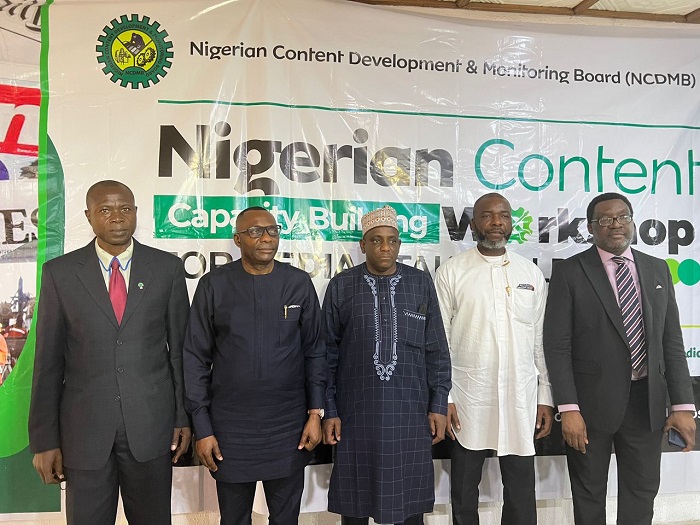L-R: Prof. Teilanyo Diri, Barrister Naboth Onyesor, Mr. Abdulmalik Halilu, Mr. Dan Esueme Kikile and Mr. Steve Ayorinde at NCDMB Capacity Building Workshop held in Lagos for Media Stakeholders.
-By Felix Douglas
The Nigerian Content Development and Monitoring Board (NCDMB) held its 3rd consecutive capacity building workshop for media stakeholders in Lagos.
Speaking on the Workshop, Manager, Corporate Communications, Barrister Naboth Onyesor, said the essence of the workshop is to promote collaboration with media practitioners and critical stakeholders in the implementation of Nigerian Content and to use the forum as opportunity to support media partners to develop their skills in the profession.
Seasoned professionals and resource persons were invited to provide useful information about the Board and train media stakeholders.
Presenting his insight on Research and Development as a partway for deepening Nigerian Content implementation, Mr. Abdulmalik Halilu, General Manager, Research, Statistics & Development, explained what the NCDMB is doing in aspect of Research and Development emphasising that the Board gives a lot of value and the industry is encouraged to carry out research and development activities in-country which it has notl involved in the past. There are provisions to regulate research and development in the oil and gas industry. The Board sees a lot of value that will be extracted when research and development is used because it will lead to job creation and innovation which will help Nigeria to domicile and domesticate most of the activities in the oil and gas industry.
Halilu pointed out that the Board has established Research and Development Council to thrive the initiative.
There is a research and development fund to support relevant applied research in the oil and gas industry and NCDMB is adopting tripled modules which a collaboration between government, academia and industry as one of the best ways to drive research and development.
Since the Workshop is meant to train Journalists, media practitioners had some tips from Mr. Steve Ayorinde, former Editor of Punch Newspapers and erstwhile Commissioner of Information of Lagos State.
He enjoined media practitioners to brace up and be well positioned to grow in their chosen career.
Ayorinde made it known that in the media industry, a journalist should define his goal, focused, prepared to be visible and noticed by finding a niche area and deepened knowledge in order to become an authority which will position them for greater opportunities.
He gave some nuggets to journalists that they should be thorough bred in the industry combining critical skills set for development. Improving writing skills and acquiring some other capabilities like photography, design, public speaking proficiency among others. Hence, these skills can be useful when opportunity presents itself in future.
He stated further that journalists should always be available and modest with positive social media presence. A journalist should always be prepared to branch out and not be caught unaware in case issues arise in the course of discharging his duties.
Giving his perspective on NCDMB 11 years of Monitoring & Evaluating Nigerian Content implementation, Mr. Dan Esueme Kikile, Manager, Capacity Building, Monitoring Directorate, was of the view that when the Board was created in 2010, Nigeria Content level was less than 5% and due to consistent monitoring and development of local capacities the Board has since grown Content capacity to 42% in 2021.
This is a significant progress when compared from the NCDMB inception. The Board has observed in the past 11 years that there are abundant personnel with expertise in different fields to man positions in the oil and gas industry which were previously occupied by foreigners.
There are diverse abundant opportunities in the oil and gas industry in the Act where Nigerians can derive value in hydrocarbon resources.
Kikile highlighted some challenges in the Board which includes: cases of grievances and non-compliance by operators in the industry especially indigenous and foreign service companies, inadequate collaboration among Ministries, Department and Agencies (MDAs) that have responsibilities to regulate oil and gas operation which created issues.
Notwithstanding, with the passage of Petroleum Industry Act (PIA) most of the issues have streamlined and responsibilities of relevant government agencies have been clearly defined. Going forward these issues will be addressed.
The media is expected to be consistent in its reportage and embark on investigative journalism by observing industry players pointing out infractions should compliance be compromised.
Therefore, NCDMB urges the media to play a greater role in sensitizing and creating awareness about Nigerian Content because it is the “last chance to trigger development otherwise it will be lost completely.”
On the aspect of media training and keeping abreast with the fourth estate of the realm, Professor Teilanyo Diri, of the Faculty of Humanities & Social Sciences, Federal University, Otuoke in Bayelsa State, said there is need to improve competencies to meet evolving trends.
He highlighted importance of traditional and new media noting that most of those virtues and qualities for which traditional media was recognized such accuracy and creativity are lacking. The new media has given room for all manner of reports becoming an all-comers affairs with no requisite training which traditional media is known.
Professor Diri noted a caution that any side of the divide either traditional or new media, that practitioners should stick to the hallowed ethics of the profession which is the bedrock of responsible journalism. There is need for through checks before going to public space.
He emphasized on fake news which is synonymous with new media, any published story that is not verifiable is fake with avenue for litigation leading to libel.
The Professor of English said the future of journalism is digital but does necessarily implies that the new media will outdate and make traditional media irrelevant due to technological advancement and global acceptance.
Regardless of emerging threats, traditional media has its place and will not be jettisoned provided practitioners adapt to prevailing circumstances.


Comment here